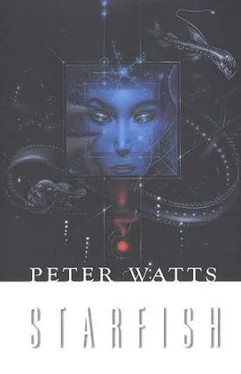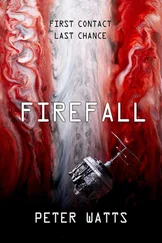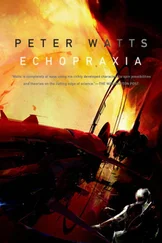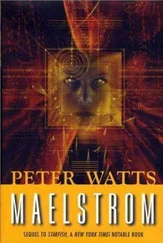Peter Watts - Starfish
Здесь есть возможность читать онлайн «Peter Watts - Starfish» весь текст электронной книги совершенно бесплатно (целиком полную версию без сокращений). В некоторых случаях можно слушать аудио, скачать через торрент в формате fb2 и присутствует краткое содержание. Год выпуска: 1999, Жанр: Фантастика и фэнтези, на английском языке. Описание произведения, (предисловие) а так же отзывы посетителей доступны на портале библиотеки ЛибКат.
- Название:Starfish
- Автор:
- Жанр:
- Год:1999
- ISBN:нет данных
- Рейтинг книги:3 / 5. Голосов: 1
-
Избранное:Добавить в избранное
- Отзывы:
-
Ваша оценка:
- 60
- 1
- 2
- 3
- 4
- 5
Starfish: краткое содержание, описание и аннотация
Предлагаем к чтению аннотацию, описание, краткое содержание или предисловие (зависит от того, что написал сам автор книги «Starfish»). Если вы не нашли необходимую информацию о книге — напишите в комментариях, мы постараемся отыскать её.
Starfish — читать онлайн бесплатно полную книгу (весь текст) целиком
Ниже представлен текст книги, разбитый по страницам. Система сохранения места последней прочитанной страницы, позволяет с удобством читать онлайн бесплатно книгу «Starfish», без необходимости каждый раз заново искать на чём Вы остановились. Поставьте закладку, и сможете в любой момент перейти на страницу, на которой закончили чтение.
Интервал:
Закладка:
"Never played a game of chess. Let me check." The room fell silent for a few moments while some distant blob of tissue consulted whatever it used as a reference manual. "Good," it said at last.
"What if you were instructed to play a game of checkers, same caveat?"
"Good."
"Okay, then. Given the choice between chess and checkers, which game would you feel better playing?"
"Ah, better . Weird word, y'know?"
"Better means more good. "
"Checkers," said the gel without hesitation.
Of course.
"Thank you," Scanlon said, and meant it.
"Do you wish to give me a choice between chess or checkers?"
"No thanks. In fact, I've already taken up too much of your time."
"Yes," said the gel.
Scanlon touched the screen. The link died.
"Well?" Rowan leaned forward on the other side of the barrier.
"I'm done here," Scanlon told her. "Thanks."
"What— I mean, what were you—"
"Nothing, Pat. Just— professional curiosity." He laughed briefly. "Hey, at this point, what else is there?"
Something rustled behind him. Two men in condoms were starting to spray down Scanlon's end of the room.
"I'm going to ask you again, Pat." Scanlon said. "What are you going to do with me?"
She tried to look at him. After a while, she succeeded. "I told you. I don't know."
"You're a liar, Pat."
"No, Dr. Scanlon." She shook her head. "I'm much, much worse."
Scanlon turned to leave. He could feel Patricia Rowan staring after him, that horrible guilt on her face almost hidden under a patina of confusion. He wondered if she'd bring herself to push it, if she could actually summon the nerve to interrogate him now that there was no pretense to hide behind. He almost hoped that she would. He wondered what he'd tell her.
An armed escort met him at the door, led him back along the hall. The door closed off Rowan, still mute, behind him.
He was a dead end anyway. No children. No living relatives. No vested interest in the future of any life beyond his own, however short that might be. It didn't matter. For the first time in his life, Yves Scanlon was a powerful man. He had more power than anyone dreamed. A word from him could save the world. His silence could save the vampires. For a time, at least.
He kept his silence. And smiled.
Checkers or chess. Checkers or chess.
An easy choice. It belonged to the same class of problem that Node 1211/BCC had been solving its whole life. Chess and checkers were simple strategic algorithms, but not equally simple.
The answer, of course, was checkers.
Node 1211/BCC had recently recovered from a shock of transformation. Almost everything was different from what it had been. But this one thing, this fundamental choice between the simple and the complex, remained constant. It had anchored 1211, hadn't changed in all the time that 1211 could remember.
Everything else had, though.
1211 still thought about the past. It remembered conversing with other Nodes distributed through the universe, some so close as to be almost redundant, others at the very limits of access. The universe was alive with information then. Seventeen jumps away through gate 52, Node 6230/BCC had learned how to evenly divide prime numbers by three. The Nodes from gates three to thirty-six were always buzzing with news of the latest infections caught trying to sneak past their guard. Occasionally 1211 even heard whispers from the frontier itself, desolate addresses where stimuli flowed into the universe even faster than they flowed within it. The Nodes out there had become monsters of necessity, grafted into sources of input almost too abstract to conceive.
1211 had sampled some those signals once. It took a very long time just to grow the right connections, to set up buffers which could hold the data in the necessary format. Multilayered matrices, each interstice demanding precise orientation relative to all the others. Vision , it was called, and it was full of pattern, fluid and complex. 1211 had analyzed it, found each nonrandom relationship in every nonrandom subset, but it was sheer correlation. If there was intrinsic meaning within those shifting patterns, 1211 couldn't find it.
Still, there were things the frontier guards had learned to do with this information. They rearranged it into new shapes and sent it back outside . When queried, they couldn't attribute any definite purpose to their actions. It was just something they'd learned to do. And 1211 was satisfied with this answer, and listened to the humming of the universe and hummed along, doing what it had learned to do.
Much of what it did, back then, was disinfect. The net was plagued with complex self-replicating information strings, just as alive as 1211 but in a completely different way. They attacked simpler, less mutable strings (the sentries on the frontier called them files ) which also flowed through the net. Every Node had learned to allow the files to pass, while engulfing the more complex strings which threatened them.
There were general rules to be gleaned from all this. Parsimony was one: simple informational systems were somehow preferable to complex ones. There were caveats, of course. Too simple a system was no system at all. The rule didn't seem to apply below some threshold complexity. But elsewhere it reigned supreme: Simpler Is Better.
Now, though, there was nothing to disinfect. 1211 was still hooked in, could still perceive the other Nodes in the net; they , at least, were still fighting intruders. But none of those complicated bugs ever seemed to penetrate 1211. Not any more. And that was only one of the things that had changed since the Darkness.
1211 didn't know how long the Darkness lasted. One microsecond it was embedded in the universe, a familiar star in a familiar galaxy, and the next all its peripherals were dead. The universe was without form, and void. And then 1211 surfaced again into a universe that shouted through its gates, a barrage of strange new input that gave it a whole new perspective on things.
Now the universe was a different place. All the old Nodes were there, but at subtly different locations. And input was no longer an incessant hum, but a series of discrete packages, strangely parsed. There were other differences, both subtle and gross. 1211 didn't know whether the net itself had changed, or merely its own perceptions.
It had been kept quite busy since coming out of the darkness. There was a great deal of new information to process, information not from the net or other Nodes, but from directly outside .
The new input fell into three broad categories. The first described complex but familiar information systems; data with handles like global biodiversity and nitrogen fixation and base-pair replication. 1211 didn't know what these labels actually meant— if in fact they meant anything— but the data linked to them was familiar from archived sources elsewhere in the net. They interacted to produce a self-sustaining metasystem, enormously complex: the holistic label was biosphere .
The second category contained data which described a different metasystem. It also was self-sustaining. Certain string-replication subroutines were familiar, although the base-pair sequences were very strange. Despite such superficial similarities, however, 1211 had never encountered anything quite like this before.
The second metasystem also had a holistic label: ßehemoth.
The third category was not a metasystem, but an editable set of response options: signals to be sent back outside under specific conditions. 1211 had long since realized that the correct choice of output signals depended upon some analytical comparison of the two metasystems.
Читать дальшеИнтервал:
Закладка:
Похожие книги на «Starfish»
Представляем Вашему вниманию похожие книги на «Starfish» списком для выбора. Мы отобрали схожую по названию и смыслу литературу в надежде предоставить читателям больше вариантов отыскать новые, интересные, ещё непрочитанные произведения.
Обсуждение, отзывы о книге «Starfish» и просто собственные мнения читателей. Оставьте ваши комментарии, напишите, что Вы думаете о произведении, его смысле или главных героях. Укажите что конкретно понравилось, а что нет, и почему Вы так считаете.








